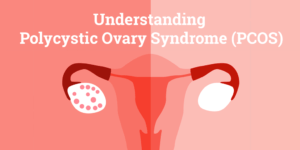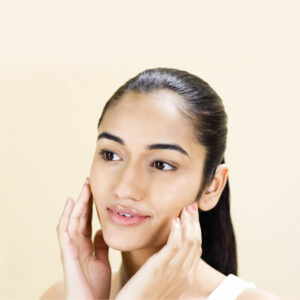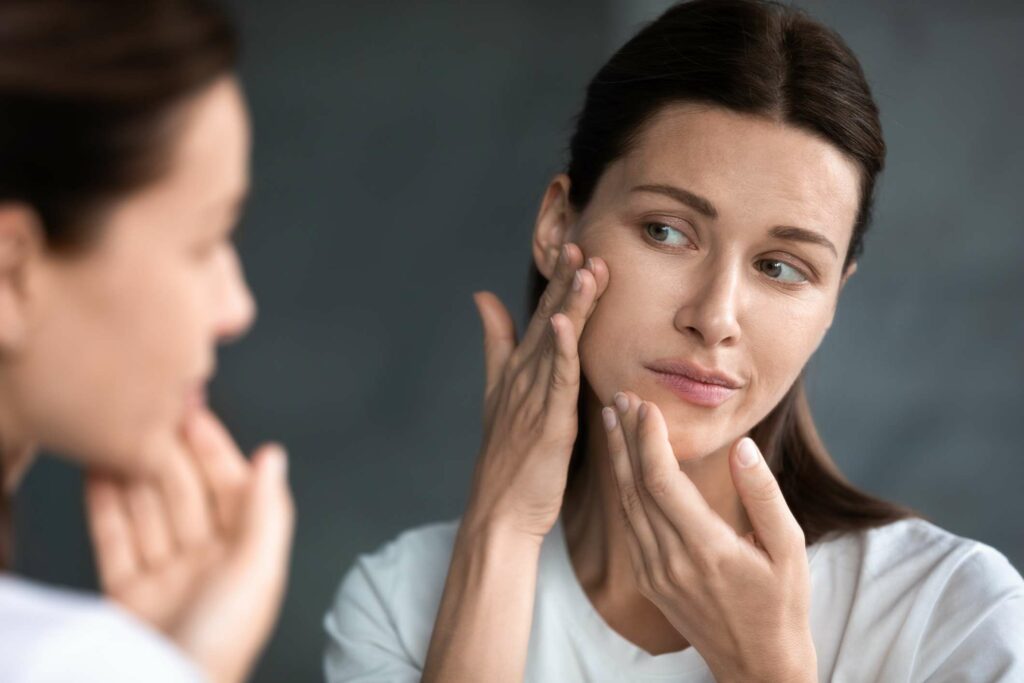PCOS acne can be one of the most frustrating and confidence-sapping skin conditions to deal with. Not only is it difficult to get rid of, but it can also leave behind scars that are difficult to fade. If you’re struggling with PCOS acne, don’t worry – we have some effective solutions for you! In this blog post, we will discuss how to treat PCOS acne using a variety of methods. We’ll talk about topical treatments, dietary changes, and more. So if you’re ready to start seeing clearer skin, keep reading!
Contents
Understanding PCOS
 PCOS is a hormonal disorder that affects women of childbearing age. It is characterized by an imbalance of reproductive hormones, which can lead to a variety of symptoms, including:
PCOS is a hormonal disorder that affects women of childbearing age. It is characterized by an imbalance of reproductive hormones, which can lead to a variety of symptoms, including:
- Weight gain
- Irregular periods
- Infertility
- Hirsutism (excess hair growth on the face and body)
- Acne
A majority of women with PCOS also have insulin resistance, which means that their bodies are unable to properly use the hormone insulin. This can lead to an increase in androgen (male hormone) levels, which can further exacerbate symptoms like acne.
Now that we’ve covered the basics of PCOS, let’s move on to discussing one of the most common symptoms – acne.
Why Does Acne Develop in PCOS?
There are a few different reasons why acne may develop in PCOS. Some of the most common include:
- An increase in androgen levels: As we mentioned earlier, women with PCOS often have high levels of androgens. Androgens are hormones that play a role in the development of acne. This is because they stimulate the production of sebum, which can lead to clogged pores and breakouts.
- A build-up of oil on the skin: Women with PCOS often have higher than normal levels of sebum, which is the oily substance that our skin produces. This can lead to a build-up of oil on the surface of the skin, which can clog pores and trap bacteria, leading to breakouts.
- Insulin resistance: Insulin resistance is common in women with PCOS, and it has been shown to increase sebum production. When you suffer from insulin resistance, your body produces more sebum than it needs which causes the build-up of oil on the skin.
- Increased inflammation: Inflammation is a key component of the acne process. Women with PCOS often have higher levels of inflammation, which can lead to breakouts. It is caused due to the increase in androgen levels, as well as insulin resistance.
So now that we know some of the reasons why acne develops in PCOS, let’s move on to discussing how to treat it.
How To Treat PCOS Acne?
Treatment for PCOS acne will vary depending on the individual. Some women may find that certain treatments work better for them than others. It’s important to experiment and find what works best for you. Here are some treatment options to consider:
Topical Treatments
There are a variety of topical treatments that can be effective in treating PCOS acne. These include:
- Retinoids: Retinoids are a type of vitamin A that can help to unclog pores and reduce inflammation. They are available in both prescription and over-the-counter forms. The principal active ingredient in prescription retinoids is tretinoin, while the principal active ingredient in over-the-counter retinoids is retinol.
- Benzoyl peroxide: Benzoyl peroxide is an antibacterial agent that can help to kill bacteria and prevent breakouts. They work by unclogging pores and reducing sebum production. Benzoyl peroxide is available in both over-the-counter and prescription forms.
- Salicylic acid: Salicylic acid is a beta-hydroxy acid that can help to exfoliate the skin and unclog pores. When used in combination with other acne treatments, it can help to reduce the number of breakouts.
- Dapsone: Dapsone is an antibiotic that can help to kill bacteria and reduce inflammation. Antibiotic resistance is a common problem with acne, so dapsone should be used in combination with other acne treatments like benzoyl peroxide or salicylic acid.
Make sure to talk to your doctor before starting any topical treatment. They can help you to choose the right product for your skin type and make sure that you’re using it safely.
Systemic Treatments
Systemic treatments are treatments that are taken orally, rather than applied topically to the skin. These can be effective in treating more severe cases of acne, or acne that is resistant to topical treatments. Systemic treatments include:
- Oral antibiotics: Oral antibiotics can help to kill bacteria and reduce inflammation. They are often prescribed in combination with other acne treatments.
- Oral contraceptives: Oral contraceptives can help to regulate hormone levels and reduce sebum production. This can be helpful in treating acne.
- Spironolactone: Spironolactone is a medication that can help to reduce androgen levels. When used in combination with other acne treatments, it can be effective in treating acne.
- Isotretinoin: Isotretinoin is a powerful medication that can help to clear acne. It is reserved for severe cases of acne that have not responded to other treatments.
These oral treatments can have side effects, so it’s important to talk to your doctor before starting any of them.
Dietary Changes
In addition to topical treatments, making dietary changes can also be effective in treating PCOS acne. Some simple dietary changes that can help include:
- Cutting back on processed foods: Processed foods are high in sugar and refined carbs, which can trigger inflammation and lead to breakouts. Try to limit your intake of processed foods and eat more whole foods instead.
- Increasing your intake of omega-three fatty acids: Omega-three fatty acids help to reduce inflammation, which can be helpful in treating acne. Good sources of omega-three fatty acids include salmon, walnuts, and flaxseeds.
- Reducing your sugar intake: Sugar is a common trigger for inflammation and breakouts. Try to limit your intake of sugary foods and drinks. You can also try substituting natural sweeteners like honey or stevia for sugar.
- Increasing your fiber intake: Fiber helps to promote a healthy gut, which can be helpful in treating acne. Good sources of fiber include fruits, vegetables, and whole grains. If you’re having trouble getting enough fiber in your diet, you can also take a fiber supplement.
A proper skincare routine, combined with a healthy diet, can be effective in treating PCOS acne. You will need to experiment to find what works best for you, but these tips can help you get started.
Supplements
 There are a few supplements that can be helpful in treating PCOS acne. These include:
There are a few supplements that can be helpful in treating PCOS acne. These include:
- Zinc: Zinc is a mineral that can help to reduce inflammation and promote healing. It’s also been shown to be effective in reducing the severity of acne. This is because it helps to reduce the amount of sebum produced by the skin.
- B vitamins: B vitamins are essential for maintaining healthy skin. They can help to reduce inflammation and promote healing. When taken in supplement form, they can be helpful in treating acne.
- Vitamin D: Vitamin D is a vitamin that can help to reduce inflammation. It’s also been shown to be effective in treating acne. If you don’t get enough vitamin D from sun exposure, you can take a supplement.
- Probiotics: Probiotics are live bacteria that help to maintain a healthy gut. They can also help to reduce inflammation and promote healing. You can take them in supplement form or eat probiotic-rich foods like yogurt, sauerkraut, and kimchi.
Supplements should be taken only when diet and lifestyle changes have not been effective in treating acne. For best results, they should be taken under the supervision of a healthcare professional.
Lifestyle changes
In addition to dietary and supplement changes, there are a few lifestyle changes that can be helpful in treating PCOS acne. These include:
- Exercising regularly: Exercise helps to reduce stress and promote a healthy hormone balance. You should aim for 30 minutes of moderate-intensity exercise every day. When combined with a healthy diet, exercise can be an effective treatment for acne.
- Getting enough sleep: Sleep is important for overall health and can help to reduce stress levels. This, in turn, can help to reduce the severity of acne. You should aim for at least eight hours of sleep per night.
- Managing stress: Stress can trigger inflammation and lead to breakouts. Try to find ways to manage stress, such as yoga, meditation, or deep breathing exercises. There are various ways to manage stress, so find what works best for you.
- Take proper care of your skin: Be sure to cleanse your skin twice daily and use a gentle, non-drying cleanser. You should also avoid picking or squeezing pimples, as this can lead to scarring.
Try to use one or more of these tips to help treat your PCOS acne. If you don’t see results within a few weeks, consult with a healthcare professional.
Acupuncture
Acupuncture is a traditional Chinese medicine technique that involves inserting thin needles into the skin. It’s been shown to be effective in treating a number of conditions, including acne. Acupuncture can help to improve hormone balance and reduce stress levels. The steps involved in the treatment are:
- The first step is to find an acupuncturist who is certified and has experience treating acne.
- Next, the acupuncturist will insert thin needles into specific points on your skin.
- After the needles are inserted, you will likely feel a tingling or numbing sensation.
- The needles will be left in place for about 20-30 minutes.
- After the treatment, you may feel relaxed and have a sense of well-being.
It’s important to note that acupuncture is not a quick fix and it may take several treatments before you see results.
Massage
 A massage is a form of therapy that involves using pressure and strokes on the body. It’s been shown to be effective in reducing stress and promoting relaxation. Massage can also help to improve circulation and promote healing. When massage is combined with essential oils, it can be an effective treatment for acne. The steps involved in the treatment are:
A massage is a form of therapy that involves using pressure and strokes on the body. It’s been shown to be effective in reducing stress and promoting relaxation. Massage can also help to improve circulation and promote healing. When massage is combined with essential oils, it can be an effective treatment for acne. The steps involved in the treatment are:
- First, you will need to find a qualified massage therapist.
- Next, the therapist will use a light touch to massage the affected areas of your skin.
- The therapist may also use essential oils to help treat your acne.
- After the treatment, you should feel relaxed and have a sense of well-being.
You need to be prepared to commit to regular treatments in order to see results. Massage sessions can be expensive, so be sure to factor this into your budget.
Tips for Managing PCOS Acne
There are a few things you can do to help manage your PCOS acne. When you are experiencing a breakout, it’s important to follow a certain skincare routine. This can help to clear up your acne and prevent future breakouts. Here are a few tips that can help:
- Wash your face twice daily with a gentle, non-drying cleanser.
- Avoid picking or squeezing pimples, as this can lead to scarring.
- Use a light, oil-free moisturizer to help keep your skin hydrated.
- Exfoliate your skin weekly with a gentle exfoliating agent.
- Apply a spot treatment to pimples as needed.
- Be sure to cleanse your skin immediately after sweating.
- Wear oil-free sunscreen when outdoors.
- Try not to touch your face throughout the day.
- If you wear makeup, be sure to choose oil-free products.
- Remove your makeup before going to bed.
- Don’t try to “mask” your acne with a heavy foundation or concealer.
- Let your skin breathe as much as possible.
While there is no cure for PCOS, following these tips can help you manage your symptoms and have clearer skin. Every woman’s experience with PCOS is unique, so find what works best for you and stick with it. When in doubt, always consult with a healthcare professional as they can offer tailored advice for your individual situation.
Conclusion
PCOS acne can be a frustrating and embarrassing condition, but there are effective solutions available. If you are struggling with PCOS acne, talk to your doctor about the best treatment options for you. With the right treatment, you can achieve clearer skin and improve your quality of life. You deserve to feel confident and beautiful, so don’t let PCOS acne keep you from living your best life. Focus on finding the right treatment and management plan for you, so you can start enjoying your life to the fullest. Stay positive and keep fighting the good fight!
You can choose to contact Mantra Care for assistance on PCOS and related acne problems. Their team of experts will be more than happy to help you develop a personalized Women Wellness Program that addresses your specific needs. You can also get in touch with our nutrition experts through our online nutrition counseling, who can guide you through the process and help you achieve your fitness goals.


